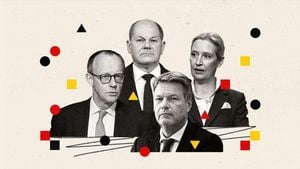Warren Buffett's Berkshire Hathaway has recently made headlines for its unprecedented accumulation of cash reserves, reaching over $334 billion by the end of 2024. This move has raised eyebrows among investors and analysts, prompting questions about Buffett's strategy and the broader market outlook.
Buffett, renowned for his stock-picking prowess, seems to have turned his focus toward cash, opting to prioritize liquidity rather than aggressively expand his investment portfolio. The record cash level reflects not only Berkshire’s conservative investment approach but also rising concerns about the high valuations observed across the stock market.
According to reports, Berkshire Hathaway’s operational earnings surged by 71% to $14.5 billion during the last quarter of 2024, significantly driven by the insurance market, particularly GEICO, which reported impressive profits following previous economic challenges. Despite this increase, Berkshire has adopted a cautious stance on its stock investments, choosing to divest from several key holdings, including shares of Apple and Bank of America.
"We are holding Berkshire to see capital get reinvested," Darren Pollock, Portfolio Director at Cheviot Value Management, commented, reaffirming the confidence investors place in Buffett’s strategic decisions. Yet, questions loom large: Why has Buffett been so reluctant to utilize the cash reserves effectively amid rising stock prices? James Shanahan, Senior Analyst at Edward Jones, provocatively asked, "Why should we buy stocks if Warren Buffett isn't buying stocks?" From their perspective, Buffett's patterns might hint at underlying challenges within the market.
A distinct trend observed over the past nine quarters showcases Berkshire Hathaway as being net sellers on the stock exchange, indicating Buffett's reservations about overvalued equities. The S&P 500 has experienced significant growth, evidenced by its record highs recently, but Buffett appears untempted by this upward momentum.
Buffett himself reflected on this strategy, stating, "We love to spend money but only when we find very low-risk, high-return investments.” This insight sheds light on his investment philosophy—one rooted more firmly still within value investing principles than speculation based on trends.
The increase of cash holdings has become increasingly relevant against the backdrop of impending interest rate adjustments and fears of economic recession. Warren Buffett's firm grip on cash positions may suggest anticipation of forthcoming opportunities when market conditions become favorable again.
Interestingly, the end of 2024 saw Berkshire temporarily halt stock buybacks for the first time, raising curiosity about its future direction. This decision meant the company did not repurchase shares at the same aggressive pace it had historically managed, citing market inadequacies and not wanting to dip below maintaining a cash level exceeding $30 billion.
Despite concerns expressed by industry observers, Buffett maintains optimism about the stock market’s future, insisting, “Shareholders can rest assured we will always prioritize investments primarily within stocks.” His commitment to stock investments, particularly with blue-chip companies, remains steadfast.
Buffett's recent actions and statements suggest he is preparing Berkshire Hathaway for what might come next. While the cash reserves have caused some to question his investment strategy, he may be following a plan to arm his successor, Greg Abel, with the necessary funds to seize opportunities when they arise.
Abel heralds the future leadership of Berkshire Hathaway, and his expertise can prove pivotal as decisions on deployments post-Buffett loom. Observers note Buffett has praised Abel’s discernment and ability to navigate complex investments, preparing him to shape the direction of one of the world’s most influential investment giants.
While Warren Buffett remains cautious, with ample cash reserves, he hands off the reins to Greg Abel, ensuring the company is ready for the next significant market shift. With high market valuations and cautious sentiment among seasoned investors, many wonder how Buffett’s strategic patience will eventually translate to investment maneuvers. The market remains watchful, anticipating how these dynamics will evolve heading through 2025.



